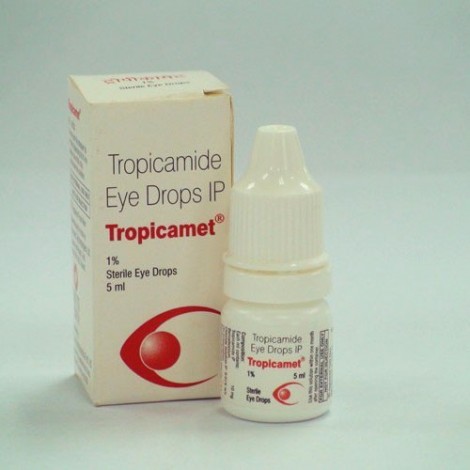MYDRIACYL (TROPICAMIDE OPHTHALMIC)
Mydriacyl Information
Mydriacyl is a popular medicine that is also commonly known under the generic name of Tropicamide ophthalmic. This medicine’s ingredients enable it to relax the eye’s muscles, dilating the pupil during an eye examination.
Mydriacyl Indications
Mydriacyl is a popular medicine that is regularly given to a patient during an eye exam (in order to relax the patient’s eye muscles and to dilate his or her pupil(s). However, this medicine could also be prescribed to treat or to prevent some other medical conditions that have not been listed in this guide.
Mydriacyl Warnings
Mydriacyl (Tropicamide Ophthalmic) is known to sometimes trigger blurred vision. It can also increase the eye’s regular sensitivity to direct sunlight. You should avoid performing any hazardous activities, or any activities that require physical or mental alertness (such as driving or operating complicated machinery) for as long as these side effects persist (they can last for up to one day).
Unless your personal healthcare provider tells you to, you must not use any other type of eye ointment or eye drops as long as the side effects (blurred vision) of Mydriacyl still persist. Before you are administered this medicine you should inform your personal physician if you are suffering from any known allergic reactions to any foods, dyes, preservatives or other type of substances (this also includes other medicines). You must not be administered this medicine if you are suffering from untreated glaucoma (an eye condition).
Mydriacyl is a category C FDA pregnancy medicine. Therefore, administration of this medicine during pregnancy could harm a growing fetus. If you are pregnant, or if you think that you might become pregnant soon, you should ask your personal physician if it is safe to be administered this medicine. It has been clearly determined that Tropicamide Ophthalmic’s ingredients are able to pass into the patient’s breast milk (they can harm a nursing infant). If you are nursing a child, you should ask your physician if it is safe to use Mydriacyl.
Mydriacyl Intake Guidelines
Ask your personal physician to tell you what is the most appropriate way in which to use Mydriacyl. Do not deviate from any of his or her instructions. If you fail to understand some of your physician’s advices, you should consult with a nurse, a doctor or a pharmacist (ask any of them to give you further indications or explanations). If you want to know more about this medicine you should carefully read the instructions from this medicine’s label.
Although Mydriacyl is regularly administered in a physician’s office (prior to an eye exam), some patients are prescribed to use it at home. These patients should carefully follow the instructions that are listed below:
Carefully wash both your hands before you use this medicine.
If you are wearing eye contact lenses, it is highly recommended that you should take them off before you apply Mydriacyl. Ask your personal healthcare provider if it is safe for you to put them back on shortly after you have been administered the eye drops.
Among this medicine’s ingredients there is Tropicamide benzalkonium chloride (a preservative) that is known to sometimes discolorate the contact lenses.
To appropriately apply the medicine:
- Slightly tilt your head back. Widely open your eyes. Pull your lower eyelid down. The dropper should be held above your eye. Make sure that you hold the dropper with its tip down. Do not look at the dropper while you squeeze the medicine. After the drop reached you eye, close it and press your inside eye corner (in order to make sure that the medicine cannot drain into the tear duct). If you have been prescribed to use more than one drop per day, you must make sure that at least 5 minutes pass between 2 applications of this medicine (in the same eye).
- You must make sure that the dropper’s tip remains sterile (it must not touch any surface, not even your hands or your eyes). If the dropper becomes contaminated, it could trigger a severe eye infection that could result in irreparable vision loss or some other type of eye damage.
You must not use Mydriacyl if the eye drops have changed their color or if you see some particles in the solution. This medicine should be stored at the average room temperature, away from heat, moisture and direct sunlight. Keep it in a place that is far from the reach of pets and children. Mydriacyl’s bottle should be kept tightly closed when it is not used.
Mydriacyl Dosage
Ask your personal physician to tell you the proper dose of Mydriacyl that you should take in.
Mydriacyl Overdose
If you suspect that you might be suffering from an overdose with Mydriacyl (if you think that you have applied too many eye drops) you must wash your eyes with plenty of water and seek medical attention as soon as possible. The average overdose symptoms could include fast heartbeat, headache, abnormal warmth or drowsiness, sub dermal redness, etc.
Mydriacyl Missed Dose
Mydriacyl is regularly administered only when it is needed, so a missed dose of this medicine is unlikely to occur.
Mydriacyl Side Effects
A prolonged treatment with Mydriacyl could cause these side effects:
- fast heart rate;
- stomach discomfort;
- hallucinations;
- stomach bloating
- blurred vision;
- burning and stinging;
- increased eye sensitivity to direct sunlight;
- swollen eyelids.
Mydriacyl Drug Reactions
Ask your physician if it is safe to take other medicines shortly after or before you are administered Mydriacyl.
Buy Mydriacyl
In some countries MYDRIACYL may also be known as: Tropicamide, Mydramide, Mydriaticum, Ocu-Tropic, Opticyl, Tropicacyl, Tropimil, Visumidriatic, Mydril, Tropicol, Ciclomidrin, Tropinom, Mydrum, Tropixal


